Regent College London: Entrepreneurship and Small Business Report
VerifiedAdded on 2023/01/19
|9
|3105
|29
Report
AI Summary
This report, prepared by a student, delves into the realm of entrepreneurship and small business management. It begins by defining entrepreneurship and exploring different types of entrepreneurial ventures, including sole proprietorships, limited liability companies, and various classifications based...

Entrepreneurship and
small business
management
small business
management
Paraphrase This Document
Need a fresh take? Get an instant paraphrase of this document with our AI Paraphraser
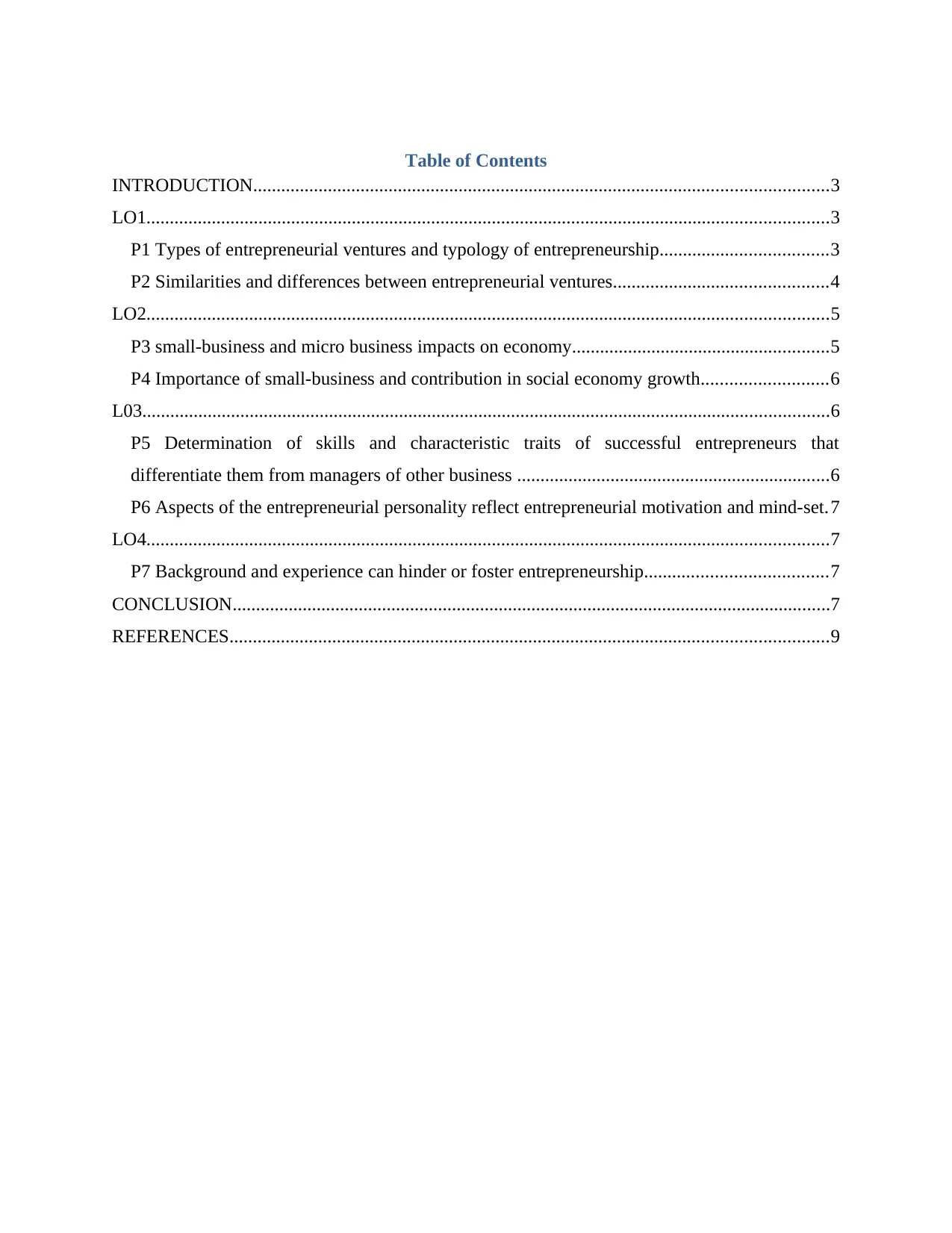
Table of Contents
INTRODUCTION...........................................................................................................................3
LO1..................................................................................................................................................3
P1 Types of entrepreneurial ventures and typology of entrepreneurship....................................3
P2 Similarities and differences between entrepreneurial ventures..............................................4
LO2..................................................................................................................................................5
P3 small-business and micro business impacts on economy.......................................................5
P4 Importance of small-business and contribution in social economy growth...........................6
L03...................................................................................................................................................6
P5 Determination of skills and characteristic traits of successful entrepreneurs that
differentiate them from managers of other business ...................................................................6
P6 Aspects of the entrepreneurial personality reflect entrepreneurial motivation and mind-set.7
LO4..................................................................................................................................................7
P7 Background and experience can hinder or foster entrepreneurship.......................................7
CONCLUSION................................................................................................................................7
REFERENCES................................................................................................................................9
INTRODUCTION...........................................................................................................................3
LO1..................................................................................................................................................3
P1 Types of entrepreneurial ventures and typology of entrepreneurship....................................3
P2 Similarities and differences between entrepreneurial ventures..............................................4
LO2..................................................................................................................................................5
P3 small-business and micro business impacts on economy.......................................................5
P4 Importance of small-business and contribution in social economy growth...........................6
L03...................................................................................................................................................6
P5 Determination of skills and characteristic traits of successful entrepreneurs that
differentiate them from managers of other business ...................................................................6
P6 Aspects of the entrepreneurial personality reflect entrepreneurial motivation and mind-set.7
LO4..................................................................................................................................................7
P7 Background and experience can hinder or foster entrepreneurship.......................................7
CONCLUSION................................................................................................................................7
REFERENCES................................................................................................................................9
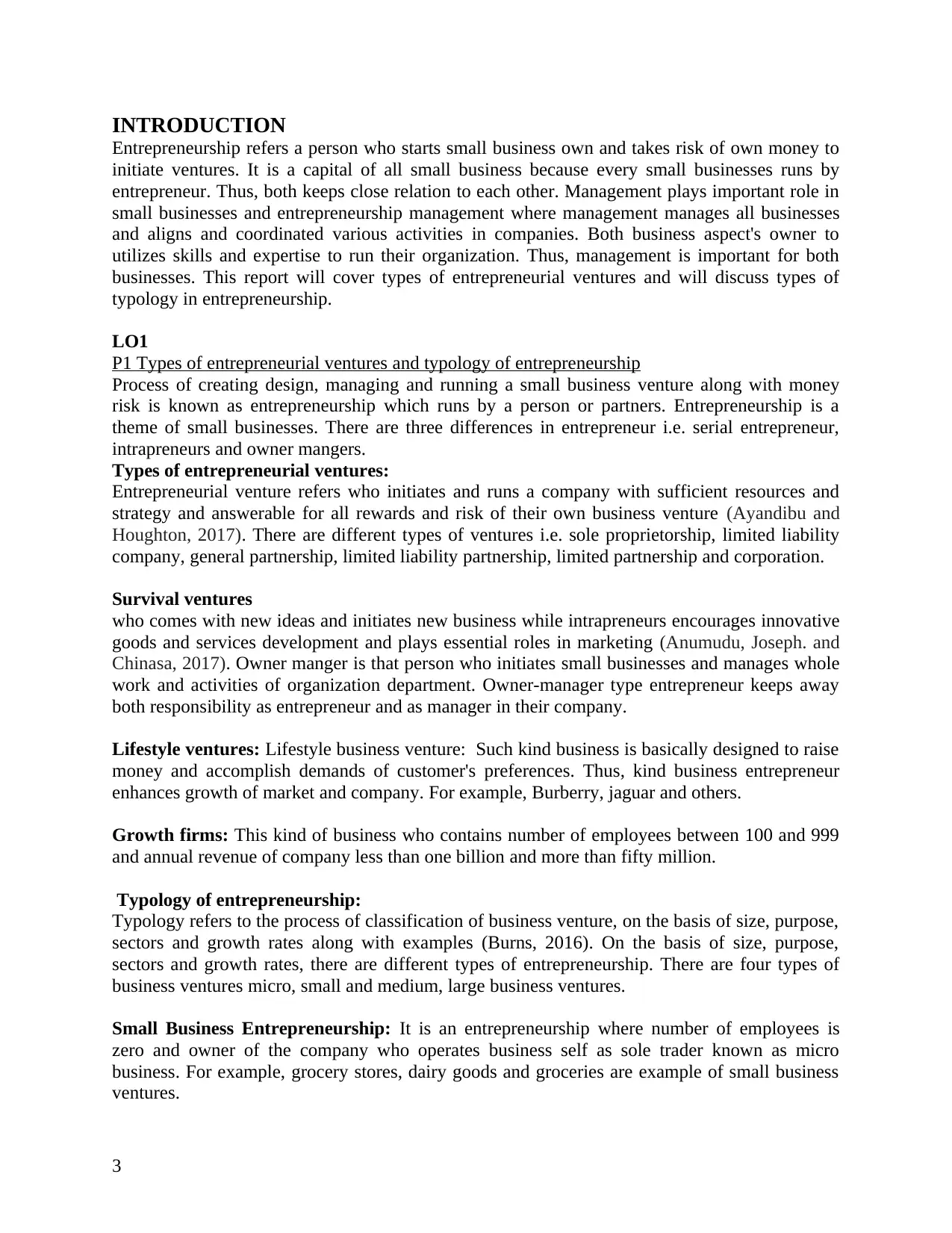
INTRODUCTION
Entrepreneurship refers a person who starts small business own and takes risk of own money to
initiate ventures. It is a capital of all small business because every small businesses runs by
entrepreneur. Thus, both keeps close relation to each other. Management plays important role in
small businesses and entrepreneurship management where management manages all businesses
and aligns and coordinated various activities in companies. Both business aspect's owner to
utilizes skills and expertise to run their organization. Thus, management is important for both
businesses. This report will cover types of entrepreneurial ventures and will discuss types of
typology in entrepreneurship.
LO1
P1 Types of entrepreneurial ventures and typology of entrepreneurship
Process of creating design, managing and running a small business venture along with money
risk is known as entrepreneurship which runs by a person or partners. Entrepreneurship is a
theme of small businesses. There are three differences in entrepreneur i.e. serial entrepreneur,
intrapreneurs and owner mangers.
Types of entrepreneurial ventures:
Entrepreneurial venture refers who initiates and runs a company with sufficient resources and
strategy and answerable for all rewards and risk of their own business venture (Ayandibu and
Houghton, 2017). There are different types of ventures i.e. sole proprietorship, limited liability
company, general partnership, limited liability partnership, limited partnership and corporation.
Survival ventures
who comes with new ideas and initiates new business while intrapreneurs encourages innovative
goods and services development and plays essential roles in marketing (Anumudu, Joseph. and
Chinasa, 2017). Owner manger is that person who initiates small businesses and manages whole
work and activities of organization department. Owner-manager type entrepreneur keeps away
both responsibility as entrepreneur and as manager in their company.
Lifestyle ventures: Lifestyle business venture: Such kind business is basically designed to raise
money and accomplish demands of customer's preferences. Thus, kind business entrepreneur
enhances growth of market and company. For example, Burberry, jaguar and others.
Growth firms: This kind of business who contains number of employees between 100 and 999
and annual revenue of company less than one billion and more than fifty million.
Typology of entrepreneurship:
Typology refers to the process of classification of business venture, on the basis of size, purpose,
sectors and growth rates along with examples (Burns, 2016). On the basis of size, purpose,
sectors and growth rates, there are different types of entrepreneurship. There are four types of
business ventures micro, small and medium, large business ventures.
Small Business Entrepreneurship: It is an entrepreneurship where number of employees is
zero and owner of the company who operates business self as sole trader known as micro
business. For example, grocery stores, dairy goods and groceries are example of small business
ventures.
3
Entrepreneurship refers a person who starts small business own and takes risk of own money to
initiate ventures. It is a capital of all small business because every small businesses runs by
entrepreneur. Thus, both keeps close relation to each other. Management plays important role in
small businesses and entrepreneurship management where management manages all businesses
and aligns and coordinated various activities in companies. Both business aspect's owner to
utilizes skills and expertise to run their organization. Thus, management is important for both
businesses. This report will cover types of entrepreneurial ventures and will discuss types of
typology in entrepreneurship.
LO1
P1 Types of entrepreneurial ventures and typology of entrepreneurship
Process of creating design, managing and running a small business venture along with money
risk is known as entrepreneurship which runs by a person or partners. Entrepreneurship is a
theme of small businesses. There are three differences in entrepreneur i.e. serial entrepreneur,
intrapreneurs and owner mangers.
Types of entrepreneurial ventures:
Entrepreneurial venture refers who initiates and runs a company with sufficient resources and
strategy and answerable for all rewards and risk of their own business venture (Ayandibu and
Houghton, 2017). There are different types of ventures i.e. sole proprietorship, limited liability
company, general partnership, limited liability partnership, limited partnership and corporation.
Survival ventures
who comes with new ideas and initiates new business while intrapreneurs encourages innovative
goods and services development and plays essential roles in marketing (Anumudu, Joseph. and
Chinasa, 2017). Owner manger is that person who initiates small businesses and manages whole
work and activities of organization department. Owner-manager type entrepreneur keeps away
both responsibility as entrepreneur and as manager in their company.
Lifestyle ventures: Lifestyle business venture: Such kind business is basically designed to raise
money and accomplish demands of customer's preferences. Thus, kind business entrepreneur
enhances growth of market and company. For example, Burberry, jaguar and others.
Growth firms: This kind of business who contains number of employees between 100 and 999
and annual revenue of company less than one billion and more than fifty million.
Typology of entrepreneurship:
Typology refers to the process of classification of business venture, on the basis of size, purpose,
sectors and growth rates along with examples (Burns, 2016). On the basis of size, purpose,
sectors and growth rates, there are different types of entrepreneurship. There are four types of
business ventures micro, small and medium, large business ventures.
Small Business Entrepreneurship: It is an entrepreneurship where number of employees is
zero and owner of the company who operates business self as sole trader known as micro
business. For example, grocery stores, dairy goods and groceries are example of small business
ventures.
3
⊘ This is a preview!⊘
Do you want full access?
Subscribe today to unlock all pages.

Trusted by 1+ million students worldwide
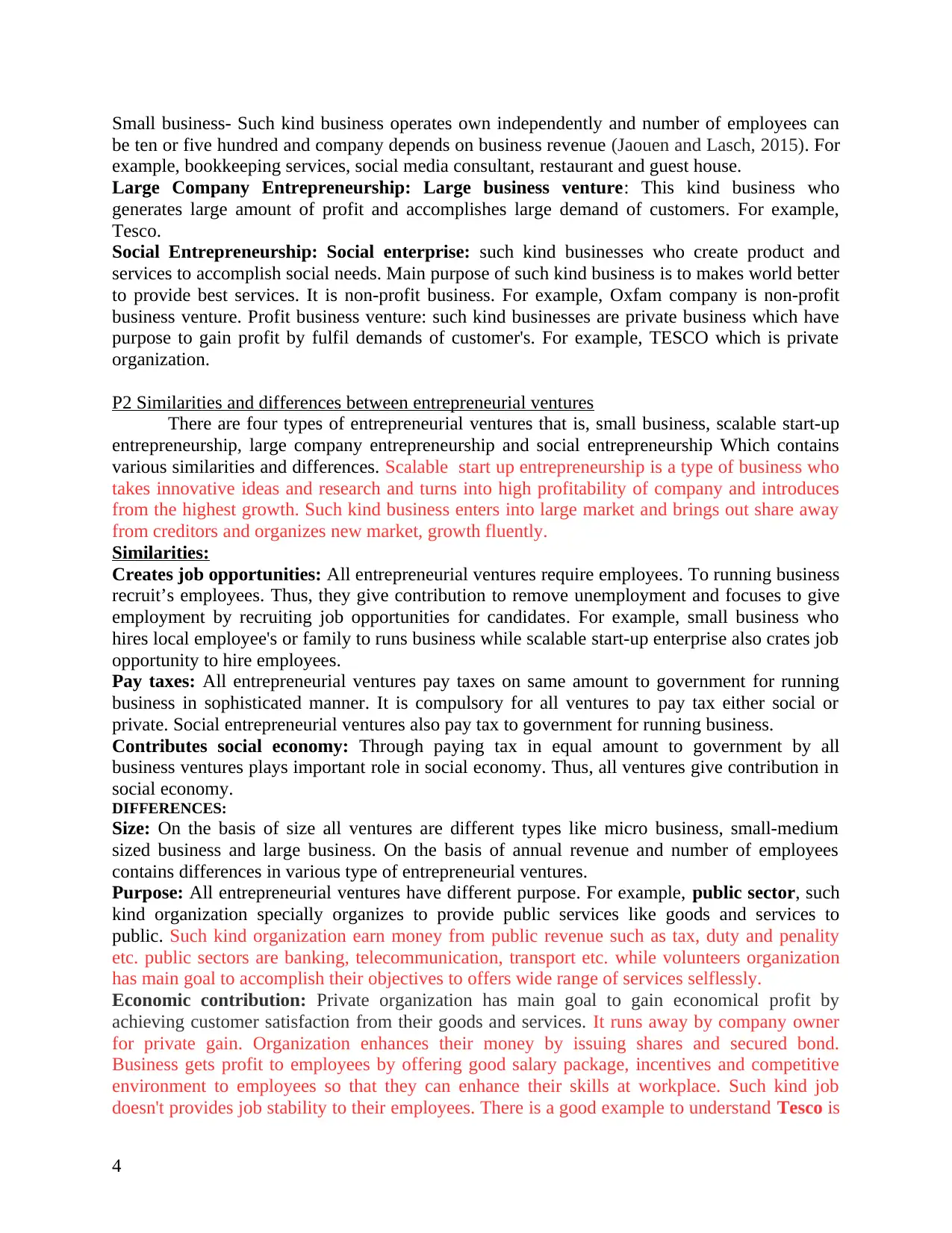
Small business- Such kind business operates own independently and number of employees can
be ten or five hundred and company depends on business revenue (Jaouen and Lasch, 2015). For
example, bookkeeping services, social media consultant, restaurant and guest house.
Large Company Entrepreneurship: Large business venture: This kind business who
generates large amount of profit and accomplishes large demand of customers. For example,
Tesco.
Social Entrepreneurship: Social enterprise: such kind businesses who create product and
services to accomplish social needs. Main purpose of such kind business is to makes world better
to provide best services. It is non-profit business. For example, Oxfam company is non-profit
business venture. Profit business venture: such kind businesses are private business which have
purpose to gain profit by fulfil demands of customer's. For example, TESCO which is private
organization.
P2 Similarities and differences between entrepreneurial ventures
There are four types of entrepreneurial ventures that is, small business, scalable start-up
entrepreneurship, large company entrepreneurship and social entrepreneurship Which contains
various similarities and differences. Scalable start up entrepreneurship is a type of business who
takes innovative ideas and research and turns into high profitability of company and introduces
from the highest growth. Such kind business enters into large market and brings out share away
from creditors and organizes new market, growth fluently.
Similarities:
Creates job opportunities: All entrepreneurial ventures require employees. To running business
recruit’s employees. Thus, they give contribution to remove unemployment and focuses to give
employment by recruiting job opportunities for candidates. For example, small business who
hires local employee's or family to runs business while scalable start-up enterprise also crates job
opportunity to hire employees.
Pay taxes: All entrepreneurial ventures pay taxes on same amount to government for running
business in sophisticated manner. It is compulsory for all ventures to pay tax either social or
private. Social entrepreneurial ventures also pay tax to government for running business.
Contributes social economy: Through paying tax in equal amount to government by all
business ventures plays important role in social economy. Thus, all ventures give contribution in
social economy.
DIFFERENCES:
Size: On the basis of size all ventures are different types like micro business, small-medium
sized business and large business. On the basis of annual revenue and number of employees
contains differences in various type of entrepreneurial ventures.
Purpose: All entrepreneurial ventures have different purpose. For example, public sector, such
kind organization specially organizes to provide public services like goods and services to
public. Such kind organization earn money from public revenue such as tax, duty and penality
etc. public sectors are banking, telecommunication, transport etc. while volunteers organization
has main goal to accomplish their objectives to offers wide range of services selflessly.
Economic contribution: Private organization has main goal to gain economical profit by
achieving customer satisfaction from their goods and services. It runs away by company owner
for private gain. Organization enhances their money by issuing shares and secured bond.
Business gets profit to employees by offering good salary package, incentives and competitive
environment to employees so that they can enhance their skills at workplace. Such kind job
doesn't provides job stability to their employees. There is a good example to understand Tesco is
4
be ten or five hundred and company depends on business revenue (Jaouen and Lasch, 2015). For
example, bookkeeping services, social media consultant, restaurant and guest house.
Large Company Entrepreneurship: Large business venture: This kind business who
generates large amount of profit and accomplishes large demand of customers. For example,
Tesco.
Social Entrepreneurship: Social enterprise: such kind businesses who create product and
services to accomplish social needs. Main purpose of such kind business is to makes world better
to provide best services. It is non-profit business. For example, Oxfam company is non-profit
business venture. Profit business venture: such kind businesses are private business which have
purpose to gain profit by fulfil demands of customer's. For example, TESCO which is private
organization.
P2 Similarities and differences between entrepreneurial ventures
There are four types of entrepreneurial ventures that is, small business, scalable start-up
entrepreneurship, large company entrepreneurship and social entrepreneurship Which contains
various similarities and differences. Scalable start up entrepreneurship is a type of business who
takes innovative ideas and research and turns into high profitability of company and introduces
from the highest growth. Such kind business enters into large market and brings out share away
from creditors and organizes new market, growth fluently.
Similarities:
Creates job opportunities: All entrepreneurial ventures require employees. To running business
recruit’s employees. Thus, they give contribution to remove unemployment and focuses to give
employment by recruiting job opportunities for candidates. For example, small business who
hires local employee's or family to runs business while scalable start-up enterprise also crates job
opportunity to hire employees.
Pay taxes: All entrepreneurial ventures pay taxes on same amount to government for running
business in sophisticated manner. It is compulsory for all ventures to pay tax either social or
private. Social entrepreneurial ventures also pay tax to government for running business.
Contributes social economy: Through paying tax in equal amount to government by all
business ventures plays important role in social economy. Thus, all ventures give contribution in
social economy.
DIFFERENCES:
Size: On the basis of size all ventures are different types like micro business, small-medium
sized business and large business. On the basis of annual revenue and number of employees
contains differences in various type of entrepreneurial ventures.
Purpose: All entrepreneurial ventures have different purpose. For example, public sector, such
kind organization specially organizes to provide public services like goods and services to
public. Such kind organization earn money from public revenue such as tax, duty and penality
etc. public sectors are banking, telecommunication, transport etc. while volunteers organization
has main goal to accomplish their objectives to offers wide range of services selflessly.
Economic contribution: Private organization has main goal to gain economical profit by
achieving customer satisfaction from their goods and services. It runs away by company owner
for private gain. Organization enhances their money by issuing shares and secured bond.
Business gets profit to employees by offering good salary package, incentives and competitive
environment to employees so that they can enhance their skills at workplace. Such kind job
doesn't provides job stability to their employees. There is a good example to understand Tesco is
4
Paraphrase This Document
Need a fresh take? Get an instant paraphrase of this document with our AI Paraphraser

a private limited company and main objectives of organization to gain profitability in company.
While volunteer’s organization's Oxfam is charitable organization which is non-profit company.
M1: Public sector: Such kind business which operates by government to provide service to
public. For example, British petroleum company. It is a type of businesses venture. This
organization is specially organized by government for example central, state and local etc.
known as public sector.
LO2
P3 small-business and micro business impacts on economy
Small-business refers a person who operates business independently along with limited
number of employees along with profit risk (Boohene and Agyapong, 2017). Small-business
plays important role in UK economy. while macro business refers who is self-trader of own
business and number of employees is zero. According to 2019 relevant data of UK is 5.8 million
small-business along with 16.6 million (approx sixty percent) employment and turnover of
small-business is 2.2 trillion (Approximately fifty-two percent). Small-business contributes
forty-seven percent of revenue of the UK economy. While, on the basis of 2018 micro business
covers 5.4 million area of UK where employment is thirty-three percent and turnover is twenty-
one percent (Spiegel and et.al., 2016). Private sector covers 5.9 million business population
which is classified in three types of business. For example, macro business covers 3.5 million
(approx 59 %) population and trading companies covers 2.0 million populations (approx 34 %)
while ordinary partnership covers seven percent population (approx 405.000). thus 1.4 million
people have employment while 4.5 million peoples doesn't have employment. Total employment
of small-business is 16.3 million approx 60%. On the basis of 2017 to 2018 finds 27000 business
population is decreased while 200,000, means 3.5% population enhances between two years
2018 to 2019. This data can understand through pictures-
5
While volunteer’s organization's Oxfam is charitable organization which is non-profit company.
M1: Public sector: Such kind business which operates by government to provide service to
public. For example, British petroleum company. It is a type of businesses venture. This
organization is specially organized by government for example central, state and local etc.
known as public sector.
LO2
P3 small-business and micro business impacts on economy
Small-business refers a person who operates business independently along with limited
number of employees along with profit risk (Boohene and Agyapong, 2017). Small-business
plays important role in UK economy. while macro business refers who is self-trader of own
business and number of employees is zero. According to 2019 relevant data of UK is 5.8 million
small-business along with 16.6 million (approx sixty percent) employment and turnover of
small-business is 2.2 trillion (Approximately fifty-two percent). Small-business contributes
forty-seven percent of revenue of the UK economy. While, on the basis of 2018 micro business
covers 5.4 million area of UK where employment is thirty-three percent and turnover is twenty-
one percent (Spiegel and et.al., 2016). Private sector covers 5.9 million business population
which is classified in three types of business. For example, macro business covers 3.5 million
(approx 59 %) population and trading companies covers 2.0 million populations (approx 34 %)
while ordinary partnership covers seven percent population (approx 405.000). thus 1.4 million
people have employment while 4.5 million peoples doesn't have employment. Total employment
of small-business is 16.3 million approx 60%. On the basis of 2017 to 2018 finds 27000 business
population is decreased while 200,000, means 3.5% population enhances between two years
2018 to 2019. This data can understand through pictures-
5
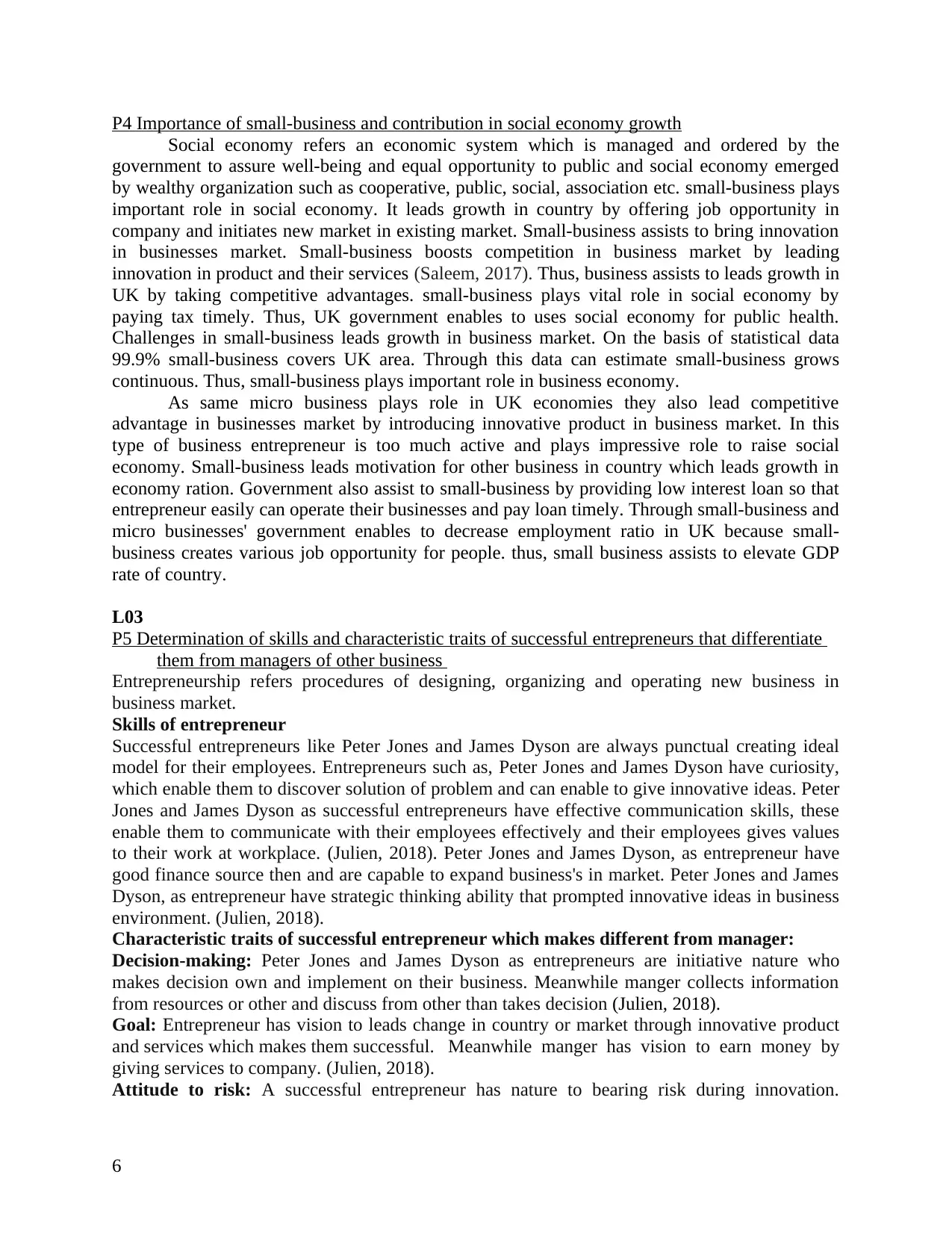
P4 Importance of small-business and contribution in social economy growth
Social economy refers an economic system which is managed and ordered by the
government to assure well-being and equal opportunity to public and social economy emerged
by wealthy organization such as cooperative, public, social, association etc. small-business plays
important role in social economy. It leads growth in country by offering job opportunity in
company and initiates new market in existing market. Small-business assists to bring innovation
in businesses market. Small-business boosts competition in business market by leading
innovation in product and their services (Saleem, 2017). Thus, business assists to leads growth in
UK by taking competitive advantages. small-business plays vital role in social economy by
paying tax timely. Thus, UK government enables to uses social economy for public health.
Challenges in small-business leads growth in business market. On the basis of statistical data
99.9% small-business covers UK area. Through this data can estimate small-business grows
continuous. Thus, small-business plays important role in business economy.
As same micro business plays role in UK economies they also lead competitive
advantage in businesses market by introducing innovative product in business market. In this
type of business entrepreneur is too much active and plays impressive role to raise social
economy. Small-business leads motivation for other business in country which leads growth in
economy ration. Government also assist to small-business by providing low interest loan so that
entrepreneur easily can operate their businesses and pay loan timely. Through small-business and
micro businesses' government enables to decrease employment ratio in UK because small-
business creates various job opportunity for people. thus, small business assists to elevate GDP
rate of country.
L03
P5 Determination of skills and characteristic traits of successful entrepreneurs that differentiate
them from managers of other business
Entrepreneurship refers procedures of designing, organizing and operating new business in
business market.
Skills of entrepreneur
Successful entrepreneurs like Peter Jones and James Dyson are always punctual creating ideal
model for their employees. Entrepreneurs such as, Peter Jones and James Dyson have curiosity,
which enable them to discover solution of problem and can enable to give innovative ideas. Peter
Jones and James Dyson as successful entrepreneurs have effective communication skills, these
enable them to communicate with their employees effectively and their employees gives values
to their work at workplace. (Julien, 2018). Peter Jones and James Dyson, as entrepreneur have
good finance source then and are capable to expand business's in market. Peter Jones and James
Dyson, as entrepreneur have strategic thinking ability that prompted innovative ideas in business
environment. (Julien, 2018).
Characteristic traits of successful entrepreneur which makes different from manager:
Decision-making: Peter Jones and James Dyson as entrepreneurs are initiative nature who
makes decision own and implement on their business. Meanwhile manger collects information
from resources or other and discuss from other than takes decision (Julien, 2018).
Goal: Entrepreneur has vision to leads change in country or market through innovative product
and services which makes them successful. Meanwhile manger has vision to earn money by
giving services to company. (Julien, 2018).
Attitude to risk: A successful entrepreneur has nature to bearing risk during innovation.
6
Social economy refers an economic system which is managed and ordered by the
government to assure well-being and equal opportunity to public and social economy emerged
by wealthy organization such as cooperative, public, social, association etc. small-business plays
important role in social economy. It leads growth in country by offering job opportunity in
company and initiates new market in existing market. Small-business assists to bring innovation
in businesses market. Small-business boosts competition in business market by leading
innovation in product and their services (Saleem, 2017). Thus, business assists to leads growth in
UK by taking competitive advantages. small-business plays vital role in social economy by
paying tax timely. Thus, UK government enables to uses social economy for public health.
Challenges in small-business leads growth in business market. On the basis of statistical data
99.9% small-business covers UK area. Through this data can estimate small-business grows
continuous. Thus, small-business plays important role in business economy.
As same micro business plays role in UK economies they also lead competitive
advantage in businesses market by introducing innovative product in business market. In this
type of business entrepreneur is too much active and plays impressive role to raise social
economy. Small-business leads motivation for other business in country which leads growth in
economy ration. Government also assist to small-business by providing low interest loan so that
entrepreneur easily can operate their businesses and pay loan timely. Through small-business and
micro businesses' government enables to decrease employment ratio in UK because small-
business creates various job opportunity for people. thus, small business assists to elevate GDP
rate of country.
L03
P5 Determination of skills and characteristic traits of successful entrepreneurs that differentiate
them from managers of other business
Entrepreneurship refers procedures of designing, organizing and operating new business in
business market.
Skills of entrepreneur
Successful entrepreneurs like Peter Jones and James Dyson are always punctual creating ideal
model for their employees. Entrepreneurs such as, Peter Jones and James Dyson have curiosity,
which enable them to discover solution of problem and can enable to give innovative ideas. Peter
Jones and James Dyson as successful entrepreneurs have effective communication skills, these
enable them to communicate with their employees effectively and their employees gives values
to their work at workplace. (Julien, 2018). Peter Jones and James Dyson, as entrepreneur have
good finance source then and are capable to expand business's in market. Peter Jones and James
Dyson, as entrepreneur have strategic thinking ability that prompted innovative ideas in business
environment. (Julien, 2018).
Characteristic traits of successful entrepreneur which makes different from manager:
Decision-making: Peter Jones and James Dyson as entrepreneurs are initiative nature who
makes decision own and implement on their business. Meanwhile manger collects information
from resources or other and discuss from other than takes decision (Julien, 2018).
Goal: Entrepreneur has vision to leads change in country or market through innovative product
and services which makes them successful. Meanwhile manger has vision to earn money by
giving services to company. (Julien, 2018).
Attitude to risk: A successful entrepreneur has nature to bearing risk during innovation.
6
⊘ This is a preview!⊘
Do you want full access?
Subscribe today to unlock all pages.

Trusted by 1+ million students worldwide
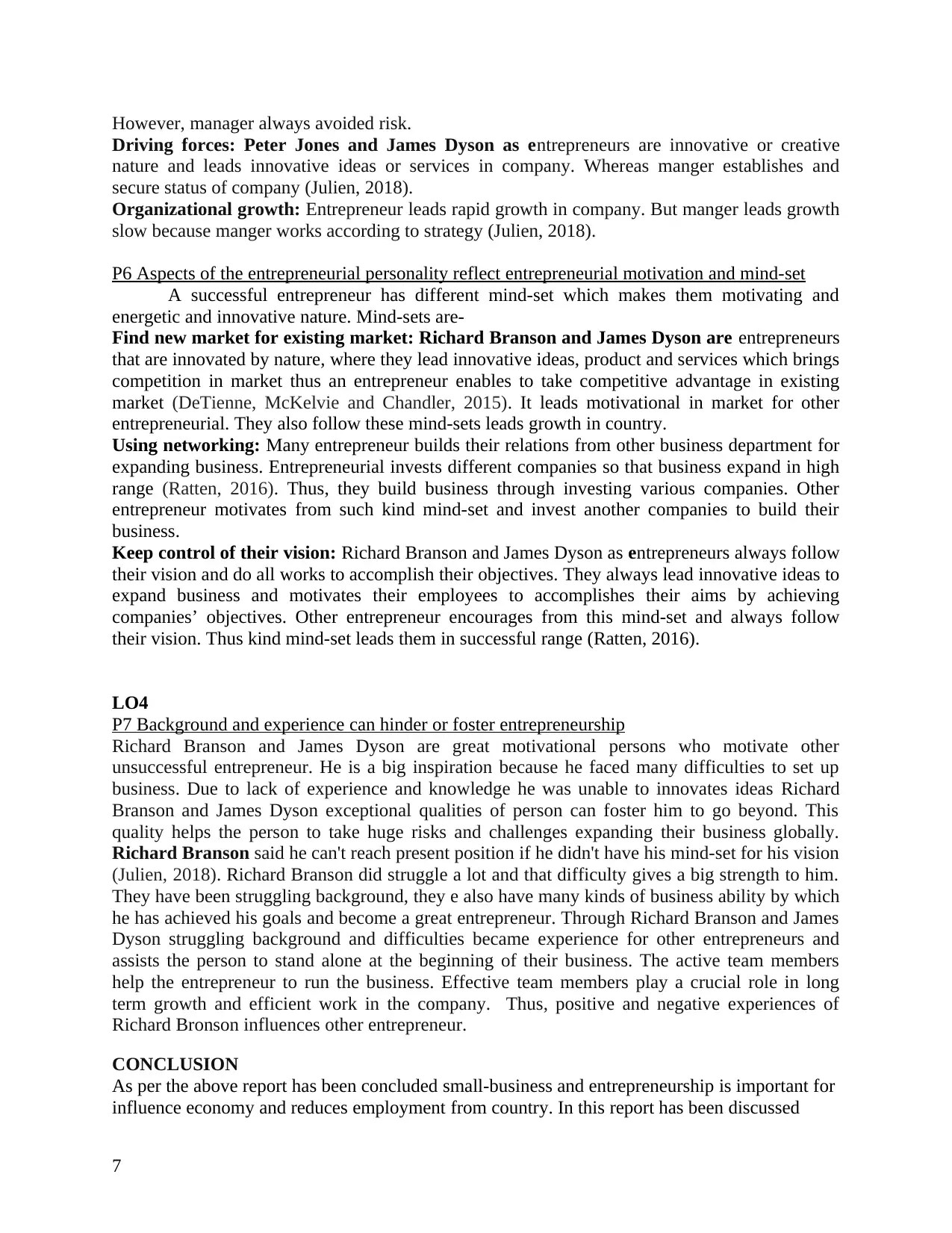
However, manager always avoided risk.
Driving forces: Peter Jones and James Dyson as entrepreneurs are innovative or creative
nature and leads innovative ideas or services in company. Whereas manger establishes and
secure status of company (Julien, 2018).
Organizational growth: Entrepreneur leads rapid growth in company. But manger leads growth
slow because manger works according to strategy (Julien, 2018).
P6 Aspects of the entrepreneurial personality reflect entrepreneurial motivation and mind-set
A successful entrepreneur has different mind-set which makes them motivating and
energetic and innovative nature. Mind-sets are-
Find new market for existing market: Richard Branson and James Dyson are entrepreneurs
that are innovated by nature, where they lead innovative ideas, product and services which brings
competition in market thus an entrepreneur enables to take competitive advantage in existing
market (DeTienne, McKelvie and Chandler, 2015). It leads motivational in market for other
entrepreneurial. They also follow these mind-sets leads growth in country.
Using networking: Many entrepreneur builds their relations from other business department for
expanding business. Entrepreneurial invests different companies so that business expand in high
range (Ratten, 2016). Thus, they build business through investing various companies. Other
entrepreneur motivates from such kind mind-set and invest another companies to build their
business.
Keep control of their vision: Richard Branson and James Dyson as entrepreneurs always follow
their vision and do all works to accomplish their objectives. They always lead innovative ideas to
expand business and motivates their employees to accomplishes their aims by achieving
companies’ objectives. Other entrepreneur encourages from this mind-set and always follow
their vision. Thus kind mind-set leads them in successful range (Ratten, 2016).
LO4
P7 Background and experience can hinder or foster entrepreneurship
Richard Branson and James Dyson are great motivational persons who motivate other
unsuccessful entrepreneur. He is a big inspiration because he faced many difficulties to set up
business. Due to lack of experience and knowledge he was unable to innovates ideas Richard
Branson and James Dyson exceptional qualities of person can foster him to go beyond. This
quality helps the person to take huge risks and challenges expanding their business globally.
Richard Branson said he can't reach present position if he didn't have his mind-set for his vision
(Julien, 2018). Richard Branson did struggle a lot and that difficulty gives a big strength to him.
They have been struggling background, they e also have many kinds of business ability by which
he has achieved his goals and become a great entrepreneur. Through Richard Branson and James
Dyson struggling background and difficulties became experience for other entrepreneurs and
assists the person to stand alone at the beginning of their business. The active team members
help the entrepreneur to run the business. Effective team members play a crucial role in long
term growth and efficient work in the company. Thus, positive and negative experiences of
Richard Bronson influences other entrepreneur.
CONCLUSION
As per the above report has been concluded small-business and entrepreneurship is important for
influence economy and reduces employment from country. In this report has been discussed
7
Driving forces: Peter Jones and James Dyson as entrepreneurs are innovative or creative
nature and leads innovative ideas or services in company. Whereas manger establishes and
secure status of company (Julien, 2018).
Organizational growth: Entrepreneur leads rapid growth in company. But manger leads growth
slow because manger works according to strategy (Julien, 2018).
P6 Aspects of the entrepreneurial personality reflect entrepreneurial motivation and mind-set
A successful entrepreneur has different mind-set which makes them motivating and
energetic and innovative nature. Mind-sets are-
Find new market for existing market: Richard Branson and James Dyson are entrepreneurs
that are innovated by nature, where they lead innovative ideas, product and services which brings
competition in market thus an entrepreneur enables to take competitive advantage in existing
market (DeTienne, McKelvie and Chandler, 2015). It leads motivational in market for other
entrepreneurial. They also follow these mind-sets leads growth in country.
Using networking: Many entrepreneur builds their relations from other business department for
expanding business. Entrepreneurial invests different companies so that business expand in high
range (Ratten, 2016). Thus, they build business through investing various companies. Other
entrepreneur motivates from such kind mind-set and invest another companies to build their
business.
Keep control of their vision: Richard Branson and James Dyson as entrepreneurs always follow
their vision and do all works to accomplish their objectives. They always lead innovative ideas to
expand business and motivates their employees to accomplishes their aims by achieving
companies’ objectives. Other entrepreneur encourages from this mind-set and always follow
their vision. Thus kind mind-set leads them in successful range (Ratten, 2016).
LO4
P7 Background and experience can hinder or foster entrepreneurship
Richard Branson and James Dyson are great motivational persons who motivate other
unsuccessful entrepreneur. He is a big inspiration because he faced many difficulties to set up
business. Due to lack of experience and knowledge he was unable to innovates ideas Richard
Branson and James Dyson exceptional qualities of person can foster him to go beyond. This
quality helps the person to take huge risks and challenges expanding their business globally.
Richard Branson said he can't reach present position if he didn't have his mind-set for his vision
(Julien, 2018). Richard Branson did struggle a lot and that difficulty gives a big strength to him.
They have been struggling background, they e also have many kinds of business ability by which
he has achieved his goals and become a great entrepreneur. Through Richard Branson and James
Dyson struggling background and difficulties became experience for other entrepreneurs and
assists the person to stand alone at the beginning of their business. The active team members
help the entrepreneur to run the business. Effective team members play a crucial role in long
term growth and efficient work in the company. Thus, positive and negative experiences of
Richard Bronson influences other entrepreneur.
CONCLUSION
As per the above report has been concluded small-business and entrepreneurship is important for
influence economy and reduces employment from country. In this report has been discussed
7
Paraphrase This Document
Need a fresh take? Get an instant paraphrase of this document with our AI Paraphraser

successful entrepreneur traits and their mind-sets which makes them successful and motivates
them. This report also has been explained about Richard Branson and James Dyson.
8
them. This report also has been explained about Richard Branson and James Dyson.
8
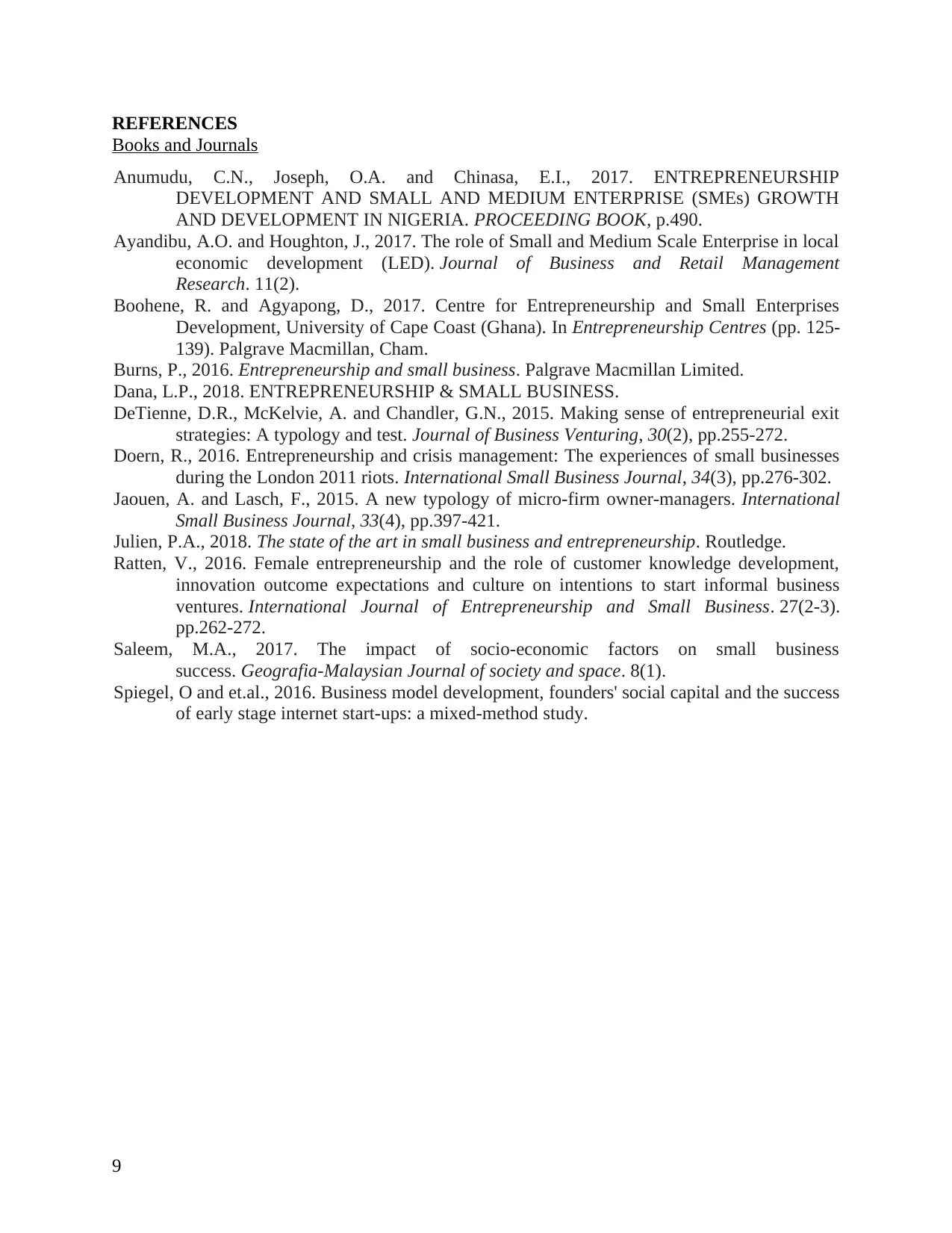
REFERENCES
Books and Journals
Anumudu, C.N., Joseph, O.A. and Chinasa, E.I., 2017. ENTREPRENEURSHIP
DEVELOPMENT AND SMALL AND MEDIUM ENTERPRISE (SMEs) GROWTH
AND DEVELOPMENT IN NIGERIA. PROCEEDING BOOK, p.490.
Ayandibu, A.O. and Houghton, J., 2017. The role of Small and Medium Scale Enterprise in local
economic development (LED). Journal of Business and Retail Management
Research. 11(2).
Boohene, R. and Agyapong, D., 2017. Centre for Entrepreneurship and Small Enterprises
Development, University of Cape Coast (Ghana). In Entrepreneurship Centres (pp. 125-
139). Palgrave Macmillan, Cham.
Burns, P., 2016. Entrepreneurship and small business. Palgrave Macmillan Limited.
Dana, L.P., 2018. ENTREPRENEURSHIP & SMALL BUSINESS.
DeTienne, D.R., McKelvie, A. and Chandler, G.N., 2015. Making sense of entrepreneurial exit
strategies: A typology and test. Journal of Business Venturing, 30(2), pp.255-272.
Doern, R., 2016. Entrepreneurship and crisis management: The experiences of small businesses
during the London 2011 riots. International Small Business Journal, 34(3), pp.276-302.
Jaouen, A. and Lasch, F., 2015. A new typology of micro-firm owner-managers. International
Small Business Journal, 33(4), pp.397-421.
Julien, P.A., 2018. The state of the art in small business and entrepreneurship. Routledge.
Ratten, V., 2016. Female entrepreneurship and the role of customer knowledge development,
innovation outcome expectations and culture on intentions to start informal business
ventures. International Journal of Entrepreneurship and Small Business. 27(2-3).
pp.262-272.
Saleem, M.A., 2017. The impact of socio-economic factors on small business
success. Geografia-Malaysian Journal of society and space. 8(1).
Spiegel, O and et.al., 2016. Business model development, founders' social capital and the success
of early stage internet start‐ups: a mixed‐method study.
9
Books and Journals
Anumudu, C.N., Joseph, O.A. and Chinasa, E.I., 2017. ENTREPRENEURSHIP
DEVELOPMENT AND SMALL AND MEDIUM ENTERPRISE (SMEs) GROWTH
AND DEVELOPMENT IN NIGERIA. PROCEEDING BOOK, p.490.
Ayandibu, A.O. and Houghton, J., 2017. The role of Small and Medium Scale Enterprise in local
economic development (LED). Journal of Business and Retail Management
Research. 11(2).
Boohene, R. and Agyapong, D., 2017. Centre for Entrepreneurship and Small Enterprises
Development, University of Cape Coast (Ghana). In Entrepreneurship Centres (pp. 125-
139). Palgrave Macmillan, Cham.
Burns, P., 2016. Entrepreneurship and small business. Palgrave Macmillan Limited.
Dana, L.P., 2018. ENTREPRENEURSHIP & SMALL BUSINESS.
DeTienne, D.R., McKelvie, A. and Chandler, G.N., 2015. Making sense of entrepreneurial exit
strategies: A typology and test. Journal of Business Venturing, 30(2), pp.255-272.
Doern, R., 2016. Entrepreneurship and crisis management: The experiences of small businesses
during the London 2011 riots. International Small Business Journal, 34(3), pp.276-302.
Jaouen, A. and Lasch, F., 2015. A new typology of micro-firm owner-managers. International
Small Business Journal, 33(4), pp.397-421.
Julien, P.A., 2018. The state of the art in small business and entrepreneurship. Routledge.
Ratten, V., 2016. Female entrepreneurship and the role of customer knowledge development,
innovation outcome expectations and culture on intentions to start informal business
ventures. International Journal of Entrepreneurship and Small Business. 27(2-3).
pp.262-272.
Saleem, M.A., 2017. The impact of socio-economic factors on small business
success. Geografia-Malaysian Journal of society and space. 8(1).
Spiegel, O and et.al., 2016. Business model development, founders' social capital and the success
of early stage internet start‐ups: a mixed‐method study.
9
⊘ This is a preview!⊘
Do you want full access?
Subscribe today to unlock all pages.

Trusted by 1+ million students worldwide
1 out of 9
Related Documents
Your All-in-One AI-Powered Toolkit for Academic Success.
+13062052269
info@desklib.com
Available 24*7 on WhatsApp / Email
![[object Object]](/_next/static/media/star-bottom.7253800d.svg)
Unlock your academic potential
© 2024 | Zucol Services PVT LTD | All rights reserved.





